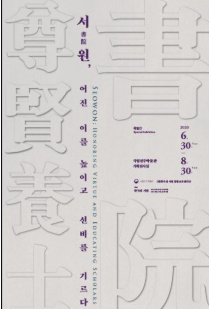
| Period| | 2020.06.30 - 2020.08.30 |
|---|---|
| Operating hours| | 9:00~18:00 |
| Space| | Jeonju National Museum/Jeolbuk |
| Address| | 249, Ssukgogae-ro, Wansan-gu, Jeonju-si, Jeollabuk-do, Republic of Korea |
| Closed| | January 1st, Lunar New Year's Day, Chuseok |
| Price| | Free |
| Phone| | 063-223-5651 |
| Web site| | 홈페이지 바로가기 |
| Artist| |
|
정보수정요청



|
|
Exhibition Information
The Jeonju National Museum of Korea will hold a special exhibition titled <Seowon, raise a good man and raise a scholar>. On July 10,2019,the 43rd UNESCO World Heritage Committee listed nine Seowon in Baku, Azerbaijan as World Heritage sites. Registered Seowon in Yeongju, Namgyeseowon in Hamyang, Oksan Seowon in Gyeongju, Dosan Seowon in Andong, Pilam Seowon in Jangseong, Dodong Seowon in Dalseong, Byeongsan Seowon in Andong, Museong Seowon in Jeongeup, Donam Seowon in Nonsan. UNESCO recognized the outstanding universal value by saying that the nine Seowon developed and preserved their own characteristics according to the situation in each region within the category of Neo-Confucianism, showing the historical process of changing the concept of Neo-Confucianism to suit the conditions of Korea. This exhibition brings together important cultural assets of nine Seowon and major museums to show the value and excellence of Seowon's World Heritage, and highlights the spirit of Seonbi, a leader who led the Joseon Dynasty, centering on Seowon, a leading educational institution of the Joseon Dynasty. Taejo(1392-1398)of the Joseon Dynasty declared in his eulogy that the school should expand its education and conduct its regular past in order to nurture and promote talented people, focusing on studying abroad. Seonggyungwan and Hyanggyo were established and educated in the country, while local scholars made efforts to foster ideal talent by forming an academic community centered on Seowon. The beginning of Korea's Seowon was established in 1543 by Ju Se-bung in Sunheung, Gyeongsang-do. The scholars asked for a national recognition of Seowon to build a social and economic foundation for talent development. Starting with SosuSeowon in 1550, Seowon developed into an educational institution for Neo-Confucianism and a comprehensive organization for intellectual culture during the Joseon Dynasty. Seowon did not just stay in the role of education, but tried to create a world where they idealized. It also played a political and social role by expanding the functions of reality, social participation and public opinion formation, and delivered his opinion to the central government by compiling local public opinion on the nation's political issues. In this special exhibition, there is a memorial tablet handed down by the state to Seowon, a containing the portrait and spirit of representative scholars in each Seowon, a painting and writing left by junior scholars visiting Seowon, a treasure house of Seowon where books and booklet are stored, and memorial alter for Seowon, which contains the social participation and spirit of the scholars who gathered the will of all the people, and the Seowon. I hope that you will be able to enjoy this special exhibition and feel the beautiful cultural heritage Seowon, and think of the spirit of scholars who talk about harmony between nature and human beings rather than material success. [Source] Jeonju National Museum Homepage
